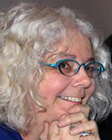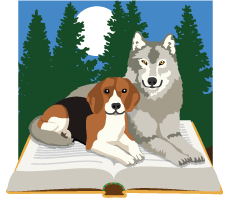|
|
 Jen Jen |
|

|
 |
Vinegar Girl
by Anne Tyler
After reading Margaret Atwood's Hag-Seed, the fourth book in the Hogarth Shakespeare Series, I decided to read another book from the series and chose Vinegar Girl by Anne Tyler. This one is a re-telling of Shakespeare's Taming of the Shrew. I was a little nervous about the treatment of Kate ("the shrew") because I've always kind of liked untamed Kate better than tamed Kate, but I needn't have worried with the writing in Anne Tyler's hands. Tyler's re-telling features Kate, her younger sister, Bunny; their father, the esteemed scientist Louis Battista; and Pyotr, the brilliant Russian who is Dr. Battista's assistant. Kate is 29 years old, single and currently not enrolled in college—instead, she's living at home, helping her father run the home and raise the teenage Bunny. She also works in a daycare/pre-school center. All of Kate’s responsibilities are ill-suited to her. I don't want to give away anymore, other than to tell you this is a terrific re-telling!
|
| |
|
 |
|
Let's Take the Long Way Home
by Gail Caldwell
I've been reading this book in preparation for our Reading Retreat. The wonderful memoir recalls the friendship between Gail and her best friend, Caroline. They meet in their 40s and much too soon, Caroline was diagnosed with cancer and dies. I'm not giving away anything telling you this, the first line of the book is: "It's an old, old story: I had a friend and we shared everything, and then she died and so we shared that, too." Let's Take the Long Way Home is much more about the friendship of Caroline and Gail than Caroline's death. The women shared writing as a career, a love of dogs, alcoholism, and a competitive nature for their respective sports (rowing for Caroline and swimming for Gail.) While you know the end is going to be sad, the journey is worth the read. I highly recommend it and can't wait to discuss it at the retreat. |
| |
|
|
|
|
|
|
|
 Sally Sally |
|
 |
|
|
|
|
| |

|
|
The Thing About Jellyfish
by Ali Benjamin
Our Book Retreat will be over by the time this newsletter arrives in your mail box, but I’ve spent much of October preparing for it. We’re reading three books—Jen reviewed Let’s Take the Long Way Home above, and I’ll write about the other two. The theme of the retreat is “Nurturing Women’s Friendships,” so that’s the context of our reviews.
How does a person react when her best friend dies? And what if the person had done something horrible to the friend and didn’t have a chance to make it right? And what if that person is only twelve years old? As Suzy Swanson struggles to understand the drowning death of her friend Franny, she decides that jellyfish were somehow responsible for Franny’s death. She compulsively learns everything she can about jellyfish. The book is a tender reflection on the nature of friendship as well as grief. It’s one of those books written for kids which is also a great read for adults.
|
| |
|

|
|
My Brilliant Friend
by Elena Ferrante
There’s been a lot of buzz in book circles lately about the identity of the author who writes under the name “Elena Ferrante.” My hope is that this interest doesn’t overshadow Ferrante’s achievement in the writing of this book, which is the first in the series Neapolitan Novels. There are four books in the series, which chronicles the lives and friendship of Elena and Lily, who live in a poor and violent neighborhood in Naples. My Brilliant Friend, narrated by Elena, takes the girls through childhood and adolescence, ending with Lila’s wedding. Their friendship is not idealized—each girl is ambitious and their interior lives are complex, as is their relationship. My hope is that book will offer some real meat for discussion at our retreat. And I want to read the whole series! |
| |
|
|
|
|
|
| |
|
|
|
|

Ann
|
|
 |
|
Small Great Things
by Jodi Picoult
Ruth Jefferson is an experienced labor and delivery nurse who is African American. She has been assigned to care for a newborn, but is soon reassigned. The reason is that the baby's parents are white supremacists who don't want Ruth to touch their child. When a crisis arises, Ruth hesitates, then makes the decision to disobey orders and perform CPR. Consequently, Ruth is charged with a serious crime.
Small Great Things is told through the eyes of the nurse, Ruth; the public defender, Kennedy; and the baby's father, Turk. I found the story to be both disturbing and insightful. Through her characters and their life stories, Piccoult raises awareness of beliefs that may lie below the surface, but greatly influence relationships and actions. Small Great Things is fiction, but the issue of race in America couldn't be more real. Great Things is both timely and riveting. Once I started reading, I didn't want to stop.
|
| |
|
 |
|
Golden Age
by Jane Smiley
Golden Age is the final book in Jane Smiley's Hundred Years Trilogy. In it, we follow the Langdons through the years 1987-2019. While there is still a Langdon presence on the Iowa farm where it all began, most of the family has scattered throughout the country and the world. We follow the next generation as they live through the Iraq War, challenges facing farmers, ups and downs in finance and government, and concerns over the effects of climate change. Along with the current events of the era, we are observers of the characters, their interactions with each other and their unique personalities. In the way that I enjoyed following the lives of the Crowley family on Downton Abbey, I became engrossed in the history of the Langdon family and a slice of America as I read The Hundred Years Trilogy. Golden Age provided a satisfying conclusion. |
| |
|
|
|
|
|
|
|
| |
|
|
|
|
|
|

Bob
|
|
 |
|
Butter: A Rich History
by Elaine Khosrova
My reviewing this book is only right, considering how I grew up. My dad worked in the butter packaging industry for 40+ years, so you could say our family had some exposure to butter! Actually, the book could be labeled, “Everything you wanted to know about Butter but were afraid to ask.” If I were teaching a college course on butter, I would want this book. It has everything, starting with the grass the animals eat and finishing with 70 pages of recipes to use the butter in. It even tells you how to make your own butter. BUT it reads really well. Yes, it has a lot of facts but they are interesting facts thrown in with just a hint of humor. It kicks around the margarine controversy, gets into the Pope’s influence on butter, and some non-culinary uses of butter (bathing—really?) I liked it and highly recommend it.
Editor’s note: the book will be released November 11. |
| |
|
|
|
|
|
|
|

Gail |
|
 |
|
|
|
|
| |

|
|
Why the Toast Always Lands Butter Side Down: The Science of Murphy's Law
by Richard Robinson
This short little book give us the scientific reason why everything that can goes wrong. It’s full of answers to questions we have had for years such as: Why is the tune you hate the most the one you can't get out of your head? Why is it that you suddenly need the object that was laying around the house for years and you just threw out? Why does the door close just as you realize you left the keys inside? You'll be the hit of the party when you can give the reasons why these crazy things happen to us. |
| |
|

|
|
Carrying Albert Home: The Somewhat True Story of a Man, His Wife and Her Alligator
by Homer Hickam
This is the story of the author's father and mother and their alligator named Albert. Elsie received him from her old boyfriend (the real Buddy Ebsen) as a wedding present. Homer says it's either him or the alligator, so they decide to take Albert back to his old home in Florida. The 1,000 mile journey is packed with bank robbers, movie stars, and rum runners. I enjoyed the action, humor, and there's even a love story. A fun book for everyone.
|
| |
|
 |
|
The Shed That Fed a Million Children
by Magnus Macfarlane-Barrow
This Scottish author has written the story of how he got started helping others. His first project was taking food to Bosnia during the Bosnian War. Eventually he started Mary's Meals. The concept is that if a child comes to school, s/he gets a free meal. Local food is used if possible and mothers take turns volunteering to cook the meals. So many non-profit organizations dump thousands of dollars into a country with no lasting results. The author believes that if the local people are responsible for the project it works much better. The book is an easy read and gives historical background in the countries where Mary's Meals are served. This was a positive answer to world hunger and I applaud the author for making a difference. |
| |
|
|
|
|
|
|
|

Hannah |
|
 |
|
|
|
|
| |

|
|
A Man Called Ove
Fredrik Backman
I was inspired to read this by the Beagle and Wolf website (as so often happens), but I wasn't prepared for Ove. He is one of a kind, so who could anticipate meeting him? He's such a grumpy man, but such a lovable one by the end. Maybe I should look closer at some of my grumpy neighbors. And that’s a high achievement for any novel, making one think about one's life.
A Man Called Ove has been made into a movie. It’s not likely to come to our local theaters, but hopefully we can see it online eventually. It looks marvelous to me. Here’s the trailer. |
| |
|

|
|
The Martian
by Andy Weir
I was inspired to read this by Bob's review: it sounded like an enjoyable way to learn some actual science. I did indeed enjoy the novel very much. I can't say I remember a lot of scientific facts, but I appreciated getting a feel for how this scientist/engineer's mind works. And I read it as a parable for the problems facing humanity on earth. Do we, like the Martian, have the resourcefulness and will to solve global warming? Can we keep good humor the way he does? (I did see the movie, but the book of course gets much deeper into everything.)
|
| |
|

|
|
Five Days at Memorial: Life and Death in a Storm-Ravaged Hospital
Sheri Fink
I didn't realize that this book is about euthanasia. I know I wouldn't be my best self after four nights with one hour sleep each, working in 100+ degree heat with sickening sights and smells everywhere. I don't think I would have made some of the decisions that a couple of the doctors and nurses made. But this book makes the horrific situation feel real, so it makes you question what makes people do things they thought they never would. Reading this is an experience. |
| |
|
|
|
|
|
| |
|
|
|
|

Tim |
|
 |
|
SPQR: A History of Ancient Rome
by Mary Beard
What exactly is history? It’s not simply a list of dates and names, but rather it's a steady process of contextual change... 'becoming'. Mary Beard, Professor of Classics at Cambridge University, lays out how a Bronze Age collection of huts on the Tiber River developed into the most influential city in the Mediterranean in an astonishingly short time, and how those changes steadily altered Roman society. Additionally, she speculates on how it continues to influence the present, through the very way we see ourselves, our politics, and our world, and most importantly how we understand "History.” Great book!
|
| |
|
|
|
|
|
— page top —
|
|



 Jen
Jen Sally
Sally







